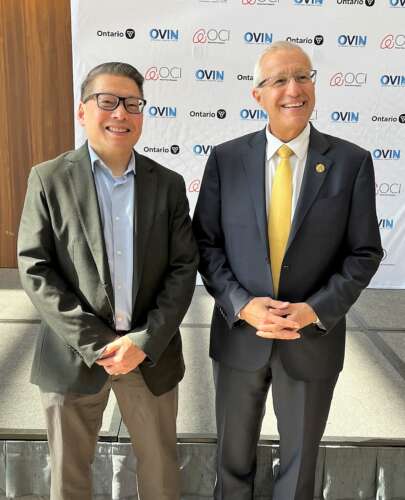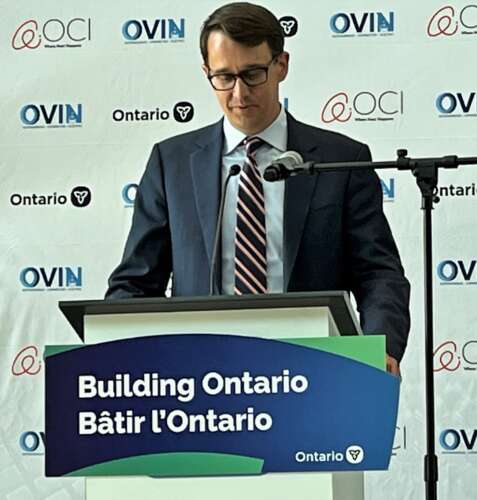The University of Guelph’s Centre for Advancing Responsible and Ethical Artificial Intelligence (CARE-AI) will launch a new micro-learning platform for high school and post-secondary students to spark interest in AI and machine learning in the automotive and mobility sectors.
The new program, expected to drive interest in future careers in the automotive and mobility industry, received provincial funding on May 30 as part of the Regional Future Workforce (RFW) program and the Ontario Vehicle Innovation Network (OVIN) at the Ontario Centre of Innovation (OCI).
“As we continue to grow Ontario’s auto supply chain, it’s important that we empower students and connect them with exciting opportunities in the sector,” said Vic Fedeli, Minister of Economic Development, Job Creation and Trade. “We’re attracting billions of dollars’ worth of investment from companies worldwide that will create thousands of new jobs.”
The RFW program aims to bridge the gap between students of all ages and the auto industry, while also focusing on reducing the stigma associated with careers in the skilled trades.
“Careers in Ontario’s auto sector offer life-changing opportunities, with good pay, pensions and benefits,” said Monte McNaughton, Minister of Labour, Immigration, Training and Skills Development. “Our government will continue to invest in innovative projects that help workers and job seekers get the skills they need to land better jobs with bigger paycheques in the auto industry.”
Non-profit organizations, school boards and post-secondary institutions will receive up to $500,000 each to lead eight-month-long automotive-focused programs for at least 500 students. Each program is designed to address the unique needs of the region and the ages of the students. Programs can range from play-based learning for young children, to manufacturing, robotics and mining workshops for older students.
“We’re encouraged and grateful for this announcement and the investment by the Government of Ontario through the Ontario Vehicle Innovation Network,” said Kevin Matsui, managing director, CARE-AI. “We look forward to providing the skills training in artificial intelligence and machine learning necessary for a thriving automotive and mobility industry in the province.”
Working in partnership with Guelph manufacturer Linamar and the Vector Institute in Toronto, CARE-AI will connect U of G’s significant expertise in AI, machine learning, deep learning and data science with the evolving needs of the automotive and mobility industry and its future workforce.
Using AI to solve real-world problems

CARE-AI involves more than 90 U of G researchers who work across multiple disciplines to solve real-world problems through AI, machine learning, deep learning and data science. The community’s work is grounded in the responsible and ethical use of AI and the team is well-connected externally with a wide range of partners.
Using leading technology and learning methodologies, CARE-AI’s new program will be delivered asynchronously through an online microlearning and gamification technology from Axonify. Students will learn on-the-go through a dynamic and adaptive platform.
The learning modules may have larger impact, with scalability for use by all secondary students in Ontario. Modules are also flexible to meet the evolving needs of industry partners.
“At the Vector Institute, we know the importance of partnering with universities that are empowering businesses with highly skilled talent and best-in-class training,” said Cameron Schuler, chief commercialization officer and vice-president, industry innovation, at the AI institute. “This program will drive innovation in the province’s automotive and mobility sectors and strengthen Ontario’s position as a global leader.”
“As a long-standing U of G partner, Linamar is proud to work with CARE-AI to advance the knowledge and skills in AI and machine learning that our future workforce will need,” said Agostino Zucco, global vice-president of Linamar’s Innovation Hub.
“As the second largest automotive parts manufacturer in Canada, Linamar is working with post-secondary partners like U of G to ready the next generation of talent for exciting new opportunities in the automotive industry.”
Automotive, mobility sectors undergoing a significant shift
OVIN is the provincial government’s flagship initiative for the automotive and transportation sector. OVIN will accelerate the commercialization and adoption of the next generation of electric, connected and autonomous vehicles and mobility technologies that contribute to a lower environmental and carbon footprint, all while supporting Ontario’s role as the manufacturing hub of Canada.

Around the world, the automotive industry is undergoing a significant shift with technological advances and evolving mobility preferences redefining its future. Through OVIN, Ontario is at the forefront of this transformation. Each OVIN program supports the development and demonstration of automotive technologies and mobility solutions.
The Regional Future Workforce program is a pilot through OVIN designed to encourage students of all ages across Ontario to pursue careers in the automotive and mobility sector.
“OCI is grateful for the support from the Government of Ontario,” said Claudia Krywiak, president and CEO, Ontario Centre of Innovation. “The three core elements that make the Regional Future Workforce program stand out are its regional reach, the inclusion of equity-deserving groups and the reach across multiple audience segments.”
“Ontario has emerged on the global stage as the jurisdiction that will usher in the future of the automotive sector as it transitions through electrification, connectivity, autonomy and mobility solutions,” said Raed Kadri, head of the Ontario Vehicle Innovation Network. “The Regional Future Workforce program is another example of Ontario’s commitment to ensuring that we have a highly skilled and diverse workforce across the province to power this industry for years to come.”
“As our government attracts record investments to build the electric cars of the future, it has never been more important to develop a skilled and experienced workforce,” said Parm Gill, Minister of Red Tape Reduction. “That’s why we’re proud to support this investment in the University of Guelph’s CARE-AI program to help teach students critical AI and machine learning skills for the automotive sector.”
Contact:
Kevin Matsui
kevin.matsui@uoguelph.ca
